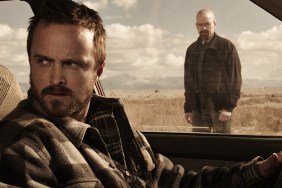
To start with, this is a great premise. Not only do we have the awesome character of Q, but we’re already asking questions about mortality. What’s more, it taps into a common human fantasy about going back in time and reliving your youth. Everyone, I think, has this fantasy deep in their hearts somewhere. If you loved your youthful years, you can go back and re-experience them with a greater adult appreciation. If you hated your childhood, you can go back – armed with your adult maturity and knowledge – and improve upon it. At the very least, you’ll have a change to finally bed The One That Got Away.
Picard wakes up in his 22-year-old body (although he still looks like Patrick Stewart to the audience) with his real heart still beating in his chest. He now must argue with peers and play it safe so that the fated knife fight would never occur. But here’s the thing: In so doing, Picard has to affect an entire change of character. He has to switch from being brash and cocky to being safe and serene. He becomes calmer and more mature, but unconvincing as, well, a youth. He does end up preventing the knife fight from occurring, but has to alienate one of his equally cocky friends. He also ends up sleeping with a school chum he always had eyes for, only to ruin their friendship in the process.

The message here is that a brash and perhaps-destructive youth is a vital and necessary part of maturity. One cannot simply intuit actual wisdom. One must acquire it through a long process of mistakes and lessons; you can’t learn unless you screw up from time to time. By going back and correcting his past mistakes, Picard was essentially betraying the things that made him who he was. By nearly dying, Picard learned about his own mortality. He didn’t gain a rich perspective on his life until he nearly died. He was lucky enough to be rescued, to grow, and to turn into an accomplished and intelligent Starfleet captain. He has a false heart to show for it, but also a greater sense of being.
So what “Tapestry” does is examine the down side of a common human fantasy. You can’t just undo the mistakes of your past, no matter how painful they were. That pain and agony and angst is now a vital part of you. Undoing it would be to undo yourself.

Indeed, “Tapestry” takes the conceit one step further. Q, seeing that Picard has undone his bar fight (and alienated his friends in the process), takes him back to the present to live again. Only now (in a brief alternate timeline) we get to see what kind of person Picard would have been had he actually learned to “play it safe” at an early age. We see that he is not a captain, but a mere lieutenant on the Enterprise, an old man who is stuck in a career rut.
As an officer (as Commander Riker explains directly to him), Picard just allows life to slide past. Without a sense of mortality or strength or wisdom, this new Picard has become a milquetoast nobody. Picard eventually calls to Q, requesting that he be taken back. He doesn’t want his entire character erased that way; he would rather die than be this new man. Q takes Picard back in time again, and he starts the bar fight he always intended. He is stabbed again. He nearly dies again. Only this time, Dr. Crusher manages to revive him.

In an epilogue, Picard wonders if he really did travel into the past, if he was in the afterlife, if it was all a hallucination, or if Q was just messing with him. He ends telling a story about his run-in with more aliens. In so telling, Picard reveals that our stories – the events of our lives that make us who we are – are our very tapestry. We cannot unravel a single part, else we unravel entirely. It’s a profound notion that not only reveals how complex and mature and wise Picard can be, but also allows us to reflect on our own lives.
Philosophical lessons, time travel, Q, an examination of Picard as a character, and a solidly-written dissection of a common fantasy, “Tapestry” is the best episode of “Star Trek: The Next Generation.” You may rebut with “The Best of Both Worlds, Part I” below.
Witney Seibold is a featured contributor on the CraveOnline Film Channel, and co-host of The B-Movies Podcast. You can read his weekly articles Trolling, Free Film School and The Series Project, and follow him on “Twitter” at @WitneySeibold, where he is slowly losing his mind.





